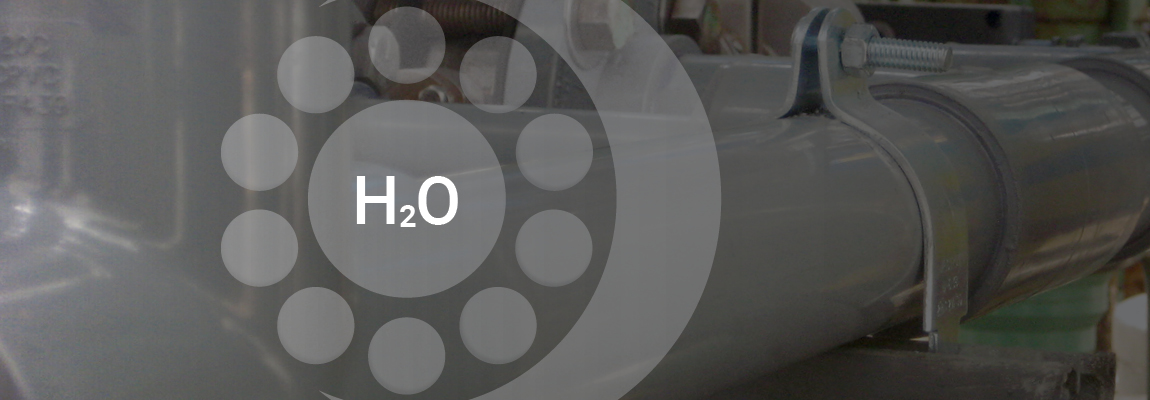Corzan® CPVC’s Superior Water Resistance
It can be easy to overlook water’s destructive potential. But water can take a harsh toll on many materials: stone erodes, wood rots and metal corrodes.
When water touches most metals, the oxygen molecules in the water accept electrons from the metal. This leads to the generation of negative oxygen ions that enter the metal and create an oxide surface. This process, known as oxidation, is a form of metal corrosion which weakens its structure.
For pipes and tanks carrying or storing water, inherently corrosion-resistant plastic piping, not metals, is the more resilient choice. And while many plastics are reliable against some types of water, only a few can handle all water types. Corzan® CPVC has been tested against nearly every form of water and has been proven to provide superior resistance in a broad range of applications.
Water Types Corzan CPVC Reliably Handles
A homopolymer of PVC, chlorinated polyvinyl chloride (CPVC) has been subjected to a chlorination reaction to contain 63% to 69% chlorine in its molecular structure. This higher chlorine content gives it additional resistance, resilience and longevity compared to other plastics and to metals against all water types.
High salinity water would quickly strip metals of their electrons and corrode pipes. Corzan CPVC is naturally resistant to salt water like brine and seawater, making it the superior choice for industrial brines and at seaside desalination facilities.
Potable water is governed by strict safety standards. Corzan CPVC is tested and certified to NSF/ANSI 14 and NSF/ANSI/CAN 61 to ensure the piping system meets performance requirements and is suitable for drinking water applications. Corzan CPVC’s smooth inner surface and immunity to pitting and scaling makes it inhospitable to the growth of biofilm and Legionella. Furthermore, the chlorine content in CPVC piping material allows it to withstand the trace amounts of treatment chemicals that remain as potable water is delivered to consumers. Many other plastic piping materials rely on sacrificial antioxidants to protect against these chemicals. Many other plastic piping materials rely on sacrificial antioxidants to protect against these chemicals, such as chlorine which is found in most potable water.
Many industrial practices and laboratories require further purification for water. They may use reverse osmosis (RO), distilled, deionized/demineralized and Ultra-Pure (Type 1) water, treated either on- or off-site. Piping material must be carefully selected to maintain purity in these applications. All water types corrode metal piping. When corrosion occurs, metal ions and even particulate can enter the water, defeating the purpose of lab-grade and ultra-pure water. All plastics resist corrosion from water, but high-purity water will pull elements from the piping (leaching). When using ultra-pure water for applications, it is extremely important to know what your piping material will leach into the water flowing through it.
Applications Appropriate for Corzan CPVC
Corzan CPVC can be specified and installed in many applications because of its chemical makeup and the broad range of water types it can handle.
Corzan CPVC has many industrial uses, both as piping material and as tank lining. In addition to withstanding the intense processes of municipal water disinfection, Corzan CPVC has a proven record of performance in power generation, chlor-alkali, semiconductor and wastewater treatment.
Corzan CPVC also has broad plumbing and HVAC uses due to its excellent preservation of water quality. Chilled water lines in hospitals and other healthcare facilities help protect patients and practitioners because Corzan CPVC can withstand the high temperatures and chemical concentrations needed to remediate or prevent biofilm and bacterial growth. For this same reason, Corzan CPVC is a strong choice for educational facilities, government and institutional buildings and in the hospitality and retail industries.
Corzan CPVC has proven durability to handle ultraviolet (UV) light, temperature extremes, and impacts, in addition to its wide range of chemical suitability testing. Because it doesn’t contain sacrificial antioxidants, Corzan CPVC can withstand more UV light than PEX piping, which can become more vulnerable to the chlorine in water when UV catalyzes the oxidation process and strips the antioxidants. Its performance also never varies whether it is installed inside or outside or above or below ground. Lubrizol provides clear advice on how to safely and effectively bury properly specified and installed Corzan CPVC piping. Furthermore, its consistent, traceable resin and exclusive partner manufacturers ensure that all Corzan CPVC product performs to the highest standards every time, no matter where you need it.
Corzan CPVC Delivers Full Water Resistance
Corzan CPVC has been tested against over 500 chemicals and compounds to determine its suitability, and water is among the top 10 chemicals that specifying engineers choose Corzan CPVC to reliably handle compared to metal and other plastics. Learn more about Corzan CPVC and water.

